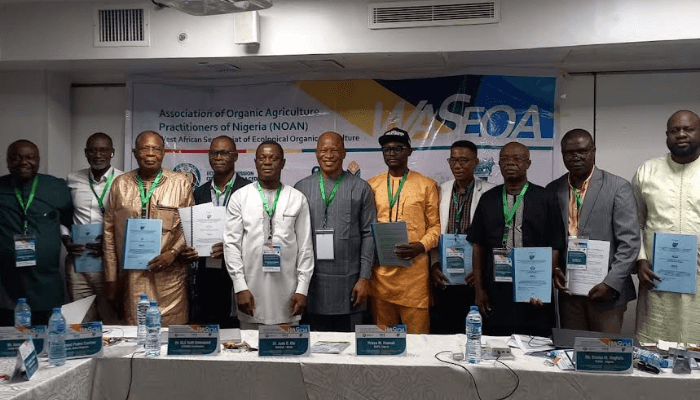The Economic Community of West African States (ECOWAS) has partnered with the West African Secretariat of Ecological Organic Agriculture (WASEOA) to support 1,270 youths in agriculture across six countries with $594,000 grant.
The agreement signed between ECOWAS and the Association of Organic Agriculture Practitioners of Nigeria (NOAN) – the secretariat of WASEOA and disburser of the grant, during a workshop organised in Lagos recently for delegates of approved training centres from Nigeria, Republic of Benin, Togo, Liberia, Cote d’Ivoire and Senegal.
The project, which is to span from April 2025 to March 2026, will train youths between 18 – 35 years on organic agriculture and agroecology practices in West Africa.
Jude Obi, president of NOAN, said that it is a significant move for Nigeria and West Africa, where up to 60 percent of the population falls within 20 – 24 years.
Read also: Burkina Faso, Mali, Niger exit hinder ECOWAS agricultural projects -Report
Therefore, this creates difficulties in employment and leads to rising unemployment or underemployment, he noted.
“NOAN has the main objective to facilitate organic agricultural practice within Nigeria so that feeding, eating and sustainability of both human health and the environment are sustained through good practices,” he added.
Obi disclosed that the level of youths who are without jobs is becoming a concern for ECOWAS, noting that this initiative aims to bridge that gap and increase larger participation in Agro-Sylvo-Pastoral Heuristics (ASPH) — a practical problem-solving technique used within agro-sylvo-pastoral systems, which integrates agriculture, forestry, and livestock farming.
“These training centres will be sub-granted to carry out this training. Specifically, in Nigeria, we are going to train 270 people. Now, these 270 people will be selected from different states of the country, and we have fragmented this training to take place in three different zones in the country,” he said.
Obi noted that in Nigeria, the training will take place in Zaria, Anambra and Oyo, with a focus on 40 percent females.
“We fragmented it in such a way that different interest areas in the training will be attracted to different youths that are resident in that place,” he noted.
Read also: Tinubu inaugurates mechanization centre in Katsina to boost agribusiness
The NOAN president said the training in Nigeria will be focused on crops that are peculiar to each state to ensure sustainability and effectiveness.
“In the north, we will focus on the training of sesame and ginger production, as these are better grown there.”
Also, Koffi Gle, chairman of regional steering committee, Department of Economic Affairs and Agriculture, ECOWAS Commission, said they were after impact and ensuring that Africa becomes food secure.
“We want to have impacts on our population, not only in terms of peace, but also have regional integration, inclusive development and sustainable development. One part of these activities is led by our directory in the sector of agriculture,” he stated.
“We have some strategies, policies and programs in which our member states are involved. One of the strategies is the regional strategy of youth employment in the agriculture sector,” Gle added.
He said the ECOWAS has observed a gap in agriculture training, employment, climate change education, and food security, citing international migration as a major challenge in Africa.
“A lot of our youth travel abroad looking for better income, but we know the potential of our agricultural area,” Gle said. “It’s very good that we support these youths to be businessmen or businesswomen in the agricultural sector.”
Read also: FG targets food security with agricultural technology programme
He added: “One of the things the Commission is doing is to support the member states through implementing the regional strategy of youth employment in agriculture. This is done by giving grants to centres that will train youths.”
Some of the coordinators who participated in the first phase of the funding shared their success stories and encouraged the incoming coordinators on the steps to take to ensure that the project in each country is a success.
Emeka Iloghalu, coordinator of Fisheries & Aquaculture Value Chain Partnership Centre in Anambra State, shared that many of the youths who participated went on to form cooperatives where they can get funding, and many are now in the process of starting their own fish ponds.
Similarly, coordinators of training centres in Liberia and Togo also shared how much impact they were able to make in the lives of the youths who participated in the first phase.

